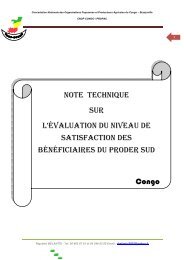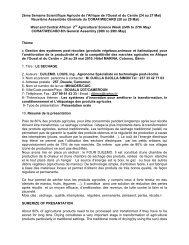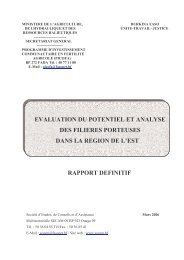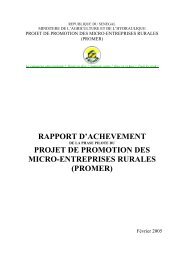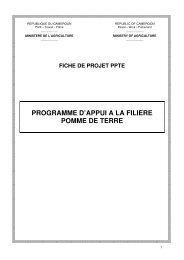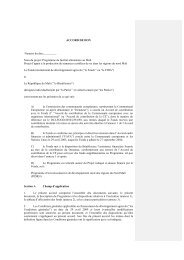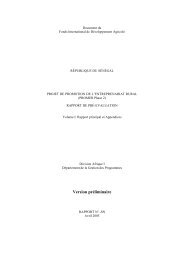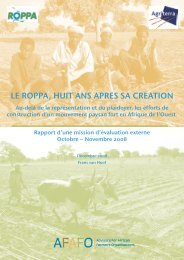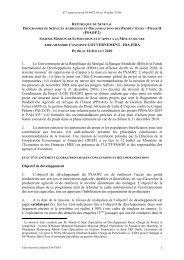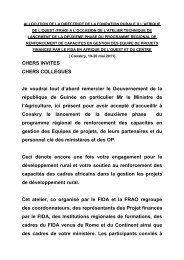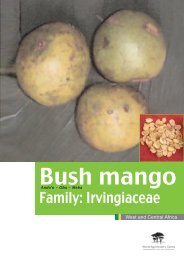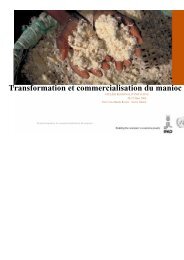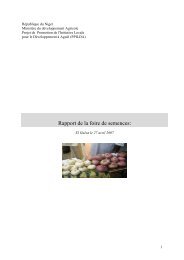Scaling Up the Fight Against Rural Poverty - FIDAfrique
Scaling Up the Fight Against Rural Poverty - FIDAfrique
Scaling Up the Fight Against Rural Poverty - FIDAfrique
Create successful ePaper yourself
Turn your PDF publications into a flip-book with our unique Google optimized e-Paper software.
Allocating IFAD’s loan funds: IFAD allocates its loan funds across countries according to a formula<br />
under a process known as “Performance-based Allocation System” (PBAS). The formula includes<br />
weighted factors for (a) size of rural population, (b) Gross National Income per capita, and (c) country<br />
performance (combining three indexes: IFAD projects at risk, rural sector performance and IDA<br />
resource allocation index). One option for providing borrowing countries and IFAD’s managers a<br />
signal that scaling up matters, is to include an indicator in <strong>the</strong> PBAS which reflects IFAD’s track<br />
record in <strong>the</strong> country in supporting <strong>the</strong> scaling up of successful programs. The justification for doing<br />
so would be that <strong>the</strong> impact of IFAD’s engagement per dollar lent is clearly greater in countries where<br />
it implements a successful scaling up strategy. However, adding ano<strong>the</strong>r such factor would have only a<br />
small impact on country allocations, due to <strong>the</strong> heavy weight given to <strong>the</strong> factor reflecting <strong>the</strong> size of<br />
<strong>the</strong> rural poor population. Hence, a better option might be to explore <strong>the</strong> use of IFAD’s grant facility to<br />
allocate funding in support of scaling initiatives as mentioned earlier.<br />
Allocating IFAD’s administrative budget: We did not probe into <strong>the</strong> details of IFAD’s administrative<br />
budget processes. From our interviews with budget and operational managers it appears that scaling up<br />
is not currently a factor reflected in <strong>the</strong> budget allocation decisions. Budget allocations are powerful<br />
signals of institutional priorities. Therefore, it would be appropriate to explore how country<br />
performance in scaling up can be incorporated in <strong>the</strong> annual allocations by region and country,<br />
presumably using <strong>the</strong> same scaling up performance indicator as suggested earlier (see previous<br />
paragraph on <strong>the</strong> PBAS related options).<br />
Managing loan numbers and size: IFAD faces a tension between restraining <strong>the</strong> growth of its<br />
administrative costs and putting more budgetary resources into its operational work as it aims to scale<br />
up. One way to resolve this tension is to keep down <strong>the</strong> number of loans while increasing loan size, as<br />
overall loanable resources increase with – hopefully – rising replenishments for IFAD. Since<br />
administrative costs are usually measured in relation to total loan commitments, budget allocations per<br />
project can increase as loan amounts increase without raising <strong>the</strong> share of administrative costs. Larger<br />
loan amounts per project will also help IFAD in pursuing its scaling up agenda. 44<br />
3. Changing IFAD’s core values to include scaling up<br />
Hartmann and Linn (2007) concluded from <strong>the</strong>ir review of <strong>the</strong> evidence on scaling up that ultimately<br />
scaling up is about <strong>the</strong> values and mindset of <strong>the</strong> people engaged in development and development<br />
assistance. IFAD has a concise and cogent statement of its core values. It explicitly refers to<br />
“innovation”. 45 As such <strong>the</strong> statement reflects IFAD’s success in recent years in turning <strong>the</strong> mindset of<br />
IFAD’s staff to seriously focus on innovation. A small, but useful step would be to include in IFAD’s<br />
core value statement an explicit reference to <strong>the</strong> goal of scaling up. More importantly, IFAD’s Board<br />
and managers would need to sign on to a fundamental shift in mindset and orientation and share this<br />
with all of IFAD’s staff – and ultimately all of IFAD’s partners on <strong>the</strong> ground – so that for every rural<br />
poverty intervention that IFAD supports two questions are asked as standard practice: “Is this<br />
intervention scaling up our prior experience and/or that of o<strong>the</strong>rs?” and “If this intervention works,<br />
should it and how could it be scaled up?”<br />
44 One staff member of a regional division commented that larger loan and project size may require different<br />
management methods compared with those used for IFAD’s traditionally relatively small loans. This will have to<br />
be monitored.<br />
45 IFAD, “IFAD’s core values”. http://www.ifad.org/governance/values/index.htm<br />
45



